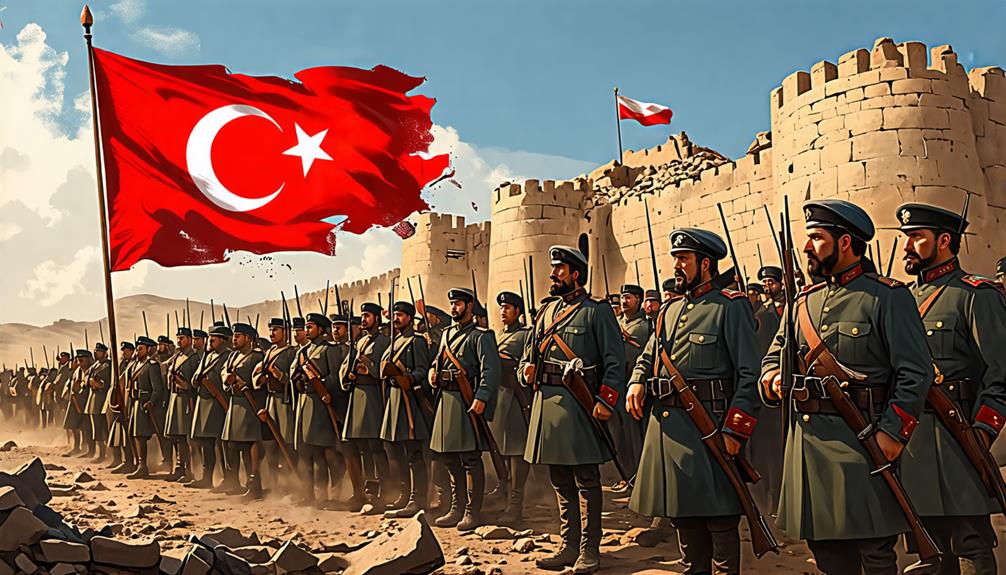In an alternate timeline, Mustafa Kemal Ataturk's ambitious reforms in Turkey failed to take root. This scenario raises intriguing questions about how the course of history would have been altered.
If Ataturk's vision had faltered, Turkey might have remained entrenched in Ottoman-style governance, with far-reaching consequences for the nation and the region.
The country could have faced challenges in modernization, international relations, and social progress, shaping a vastly different Turkey from the one we know today.
Political Instability and Authoritarianism

If Ataturk's reforms had failed, Turkey may have continued to experience political instability and authoritarianism.
One theory is that without a strong unifying leader, the country could have remained mired in cycles of coups, uprisings, and oppressive rule similar to the Ottoman era.
It's possible that democratic principles would have been slow to take hold, leaving Turkey vulnerable to continued turmoil.
While it's uncertain what would have transpired, some believe another leader may have eventually emerged to enact similar reforms, albeit at a later date.
Continued Ottoman-Style Governance
Without Ataturk's reforms, Turkey might've continued under an Ottoman-style governance system characterized by absolute monarchy and a lack of secular institutions.
One theory is that this could have meant the sultan wielding unchecked power and Sharia law dominating the legal system. It's possible that limited modernization and Westernization would have occurred.
The country may have struggled to embrace democracy, gender equality, and progress, potentially isolating itself from the international community.
However, it's conceivable that reforms similar to Ataturk's could have been implemented at a later date by another leader.
Ultimately, the long-term trajectory of Turkey in this alternate timeline is open to speculation.
Limited Women's Rights

In an alternate history where Ottoman-style governance persisted in Turkey, women's rights may have developed quite differently. One possibility is that traditional gender roles and limited access to education and employment for women could have remained entrenched in Turkish society for much longer. It's conceivable that practices like polygamy and child marriage may have persisted, and women may have lacked key legal protections and equal rights.
Interestingly, some of the reforms Ataturk championed in our timeline, such as secularization and gender equality, were later pursued to varying degrees by leaders in Iran, Afghanistan, and other Muslim-majority countries.
Religious Influence in Education
In an alternate timeline where Ataturk's secular reforms weren't implemented, religious teachings would have likely remained deeply embedded in Turkey's education system. One possibility is that the curriculum would have heavily emphasized Islamic studies, potentially at the expense of secular subjects. This could have led to a more traditionally religious society.
It's also conceivable that in this scenario, educational opportunities for women may have been more limited compared to the historical record. While later leaders may have attempted similar secular reforms, the societal impact of delaying these changes is open to speculation. Theories range from Turkey being a very different country culturally and economically, to only minor differences in its developmental path.
Strained International Relations

Had Ataturk not come to power, Turkey's international relations, particularly with the West, may have suffered. One theory is that Turkey would have remained more closely aligned with its Ottoman past and Islamic influences, putting it at odds with Europe. This could have meant changes to Turkey's diplomatic ties, trade relationships, and geopolitical alliances.
It's possible that Turkey's global standing would have been diminished without Ataturk's drive towards secularization and modernization.
However, it's worth noting that similar reforms were carried out in other Middle Eastern countries like Iran and Afghanistan at later dates, so Turkey's trajectory may have eventually followed a similar path even without Ataturk.
Ultimately, the impact of his absence on Turkey's international relations is open to interpretation.
Economic Stagnation and Underdevelopment
In an alternate reality where economic stagnation and underdevelopment afflicted Turkey due to the absence of Ataturk's transformative reforms, several outcomes could have been possible.
One theory suggests that widespread poverty and income inequality might've persisted, as the lack of industrialization and modern infrastructure would have hindered economic growth.
It's plausible that Turkey would have remained heavily reliant on agriculture, with limited foreign investment, potentially trapping the economy in the past.
While Ataturk's vision wasn't realized in this scenario, it's conceivable that similar reforms could have been implemented at a later date by another leader.
However, the delay in modernization efforts might've had long-lasting effects on Turkey's development trajectory, making it more challenging to catch up with other industrialized nations.
Linguistic and Cultural Isolation

In an alternate history where Ataturk's language and alphabet reforms didn't take place, Turkey may have remained linguistically and culturally isolated from the Western world.
One theory is that the continued use of the Arabic script would have made it more challenging for Turks to learn and communicate with European nations, potentially limiting their access to modern scientific, technological, and cultural developments in the West.
The Ottoman Turkish language, with its heavy Persian and Arabic influence, could have hindered Turkey's integration with the Western world.
However, it's possible that similar language and alphabet reforms might've been implemented by another leader at a later date, potentially leading to a different timeline for Turkey's modernization and integration with the West.
Sectarian Tensions and Conflict
In this alternate timeline, the absence of Ataturk's secularization efforts might've intensified sectarian tensions between Turkey's Sunni majority and Alevi minority. One theory is that this could have led to increased religious discrimination and violence against Alevis.
It's possible that without Ataturk's reforms promoting a unified Turkish identity, Alevis would have been underrepresented in government and public life, with Sunni-dominated policies further marginalizing the minority group. These sectarian divides had the potential to cause significant conflict and instability in Turkey.
While Ataturk's specific reforms didn't occur in this scenario, it's worth noting that similar secularization efforts were later undertaken by other leaders in Turkey, albeit to a lesser extent.
Weakened Military and Defense

Without Ataturk's military reforms, Turkey's armed forces might've remained poorly equipped, structured, and funded. This could have led to a weakened ability to defend its borders, maintain internal security, and project power in the region.
While this scenario focuses on Ataturk's era, it's possible that similar reforms could have been implemented by another leader at a later date.
However, the delay in modernizing the military might've had significant consequences for Turkey's position in the early 20th century.
Resistance to Modernization
In an alternate history where resistance to Ataturk's modernization efforts in Turkey prevailed, the country's trajectory could have been quite different. One possibility is that Turkey would have remained a more conservative, Islamic society, with traditionalists rejecting Western influences and slowing reforms. This might've meant women's rights, education, and economic development lagging behind other nations.
While Ataturk's specific vision wasn't realized in this scenario, it's conceivable that a reformist leader could have emerged later to pursue a similar path of modernization and secularization. However, they likely would have faced many of the same obstacles and opposition from religious leaders and conservative factions.
The ultimate outcome would have depended on the particular circumstances and the balance of power between progressive and traditionalist elements in Turkish society at that later time.
Conclusion
You might wonder how different Turkey would be if Ataturk's reforms had failed. Coincidentally, that alternate reality isn't hard to imagine.
You'd see a nation trapped in the past, ruled by absolute monarchy and religious law. Women's rights would be limited, education would be faith-based, and Turkey would be isolated from the modern world.
Sectarian conflict would be rife, and the military would be weak. In short, Turkey would be a shadow of what it's today.

Leave a Reply